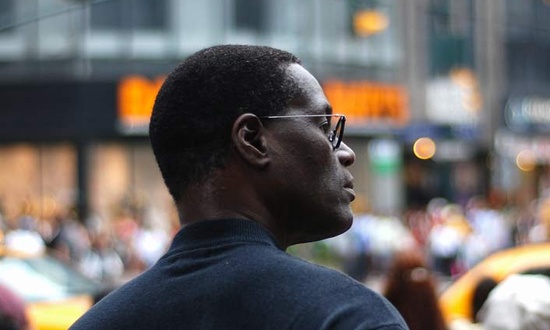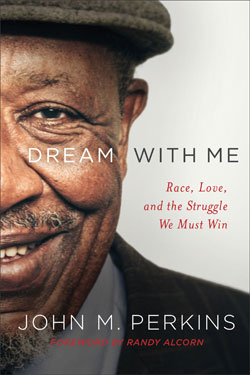 I was honored to be asked to write the foreword for John Perkin’s new book Dream With Me: Race, Love, and the Struggle We Must Win, released a few months ago. Dream With Me is wonderful. I read, loved, and highly recommend it. The book speaks for itself, but far more if you know the man behind it. So it’s John Perkins and how he’s influenced me that I want to talk about. Mine is only one story. Thousands, if given the chance, would gladly tell their stories about John—and one day, at great banquets with Christ at the head of the table, they will.
I was honored to be asked to write the foreword for John Perkin’s new book Dream With Me: Race, Love, and the Struggle We Must Win, released a few months ago. Dream With Me is wonderful. I read, loved, and highly recommend it. The book speaks for itself, but far more if you know the man behind it. So it’s John Perkins and how he’s influenced me that I want to talk about. Mine is only one story. Thousands, if given the chance, would gladly tell their stories about John—and one day, at great banquets with Christ at the head of the table, they will.
There are people who I can honestly say changed my life. John Perkins is one of them.
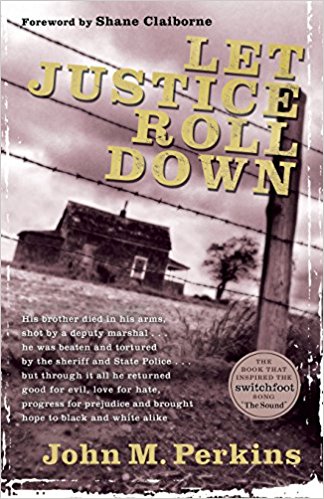 In 1976, I read Let Justice Roll Down. It stunned me. In the book I learned that in 1946, when John was sixteen, his brother Clyde was shot and killed by a deputy sheriff while waiting for a theater to open. Twenty years later, John spoke out for voter registration and took on segregation when he enrolled his son Spencer in an all-white high school. After organizing a boycott, he was arrested. His beloved wife, Vera Mae, and his children, who were outside the Mississippi jail, heard him beaten and tortured.
In 1976, I read Let Justice Roll Down. It stunned me. In the book I learned that in 1946, when John was sixteen, his brother Clyde was shot and killed by a deputy sheriff while waiting for a theater to open. Twenty years later, John spoke out for voter registration and took on segregation when he enrolled his son Spencer in an all-white high school. After organizing a boycott, he was arrested. His beloved wife, Vera Mae, and his children, who were outside the Mississippi jail, heard him beaten and tortured.
I knew all this from reading that powerful book. But in 1988, I met John when both of us were speaking at a writers’ conference. I took him to lunch and asked him questions. He told me he had dropped out of school in the third grade, but our coffee cups weren’t half empty before I realized he was one of the wisest men I’d ever met. John smiled a lot and then shed a tear. When he crossed his legs, his raised pant leg revealed a sizable scar. I don’t know whether that scar was old or new, temporary or permanent, from an accident or surgery or torture—but to me it symbolized what he’d endured and gave power to his words about forgiveness.
I’m not easily impressed, but after two hours I knew John Perkins was the real deal. Jesus came “full of grace and truth” (John 1:14 NKJV). Christ’s fingerprints were all over John. He could have been angry and bitter; instead, he embodied gospel grace. He was incredibly kind to me, a thirty-four-year-old white suburban pastor trying to understand the world. Jesus flipped a switch in me that day, as he has with countless others who’ve hung out with John.
A year later, not coincidentally, I became involved in peaceful, nonviolent civil disobedience, modeled after the civil rights movement. This resulted in multiple arrests, brief jail stays, the loss of my job, and decidedly unpopular news coverage. The cause was different (defending the rights of unborn children), but as Martin Luther King Jr. put it, “Injustice anywhere is a threat to justice everywhere.”
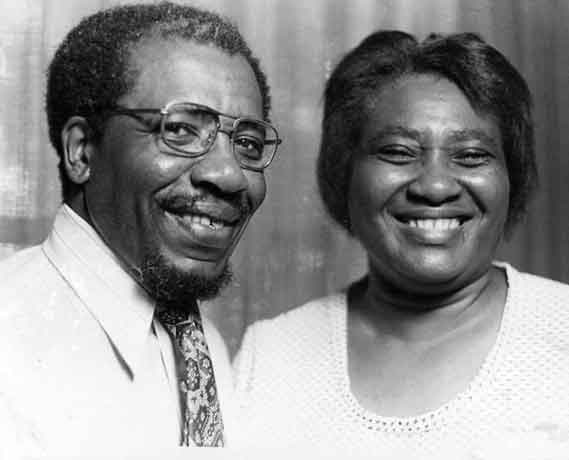 When arrests and lawsuits kept me from continuing as a pastor, I started Eternal Perspective Ministries, which continues to give away all my book royalties to kingdom causes. Besides missions, pro-life work, and helping the poor, some of my other central concerns were racial justice and reconciliation. This came about because of John’s influence, and I’ve been honored to support the John and Vera Mae Perkins Foundation for Reconciliation, Justice, and Christian Community Development.
When arrests and lawsuits kept me from continuing as a pastor, I started Eternal Perspective Ministries, which continues to give away all my book royalties to kingdom causes. Besides missions, pro-life work, and helping the poor, some of my other central concerns were racial justice and reconciliation. This came about because of John’s influence, and I’ve been honored to support the John and Vera Mae Perkins Foundation for Reconciliation, Justice, and Christian Community Development.
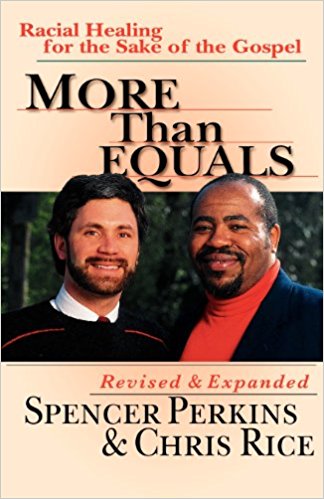 When writing my novel Dominion in 1995, I made my main character a black journalist who grew up in Mississippi. I immersed myself in black history and interviewed many African Americans (including Reggie White, who was then playing for the Green Bay Packers). I contacted John’s son Spencer, who lived in Jackson with the family of Chris Rice, a white brother. Chris and Spencer had coauthored More Than Equals, a book on racial reconciliation that I really appreciated. I asked if I could meet with them and ended up in their home with their families.
When writing my novel Dominion in 1995, I made my main character a black journalist who grew up in Mississippi. I immersed myself in black history and interviewed many African Americans (including Reggie White, who was then playing for the Green Bay Packers). I contacted John’s son Spencer, who lived in Jackson with the family of Chris Rice, a white brother. Chris and Spencer had coauthored More Than Equals, a book on racial reconciliation that I really appreciated. I asked if I could meet with them and ended up in their home with their families.
I attended a Christian Community Development Association National Conference where John Perkins spoke. That afternoon as he walked me down the streets of Jackson, stories overflowed from his heart and mind. He took me into a thrift shop where he found an old hat that was tagged for twenty-five cents. He tried it on and asked for my verdict. I told him it looked snazzy. I’ll never forget his delight at that treasure he’d found!
The girl at the counter recognized John as the founder of the ministry that owned the thrift shop and said, “Dr. Perkins, you shouldn’t pay for that!” He insisted and then handed her the quarter and proudly put on his hat. I smiled every time I looked at him the rest of the day. What great happiness this man found in something so small—he saw life crowded with God’s kindnesses, which helped me see the same.
My favorite character in my novels is Obadiah Abernathy, who played baseball in the old Negro leagues. He modeled dignity, grace, wisdom, and humor. My sports inspiration for Obadiah was Buck O’Neil of the Kansas City Monarchs, but my spiritual inspiration was John Perkins. Whenever I wrote dialogue for Obadiah, I asked myself, What would John say?
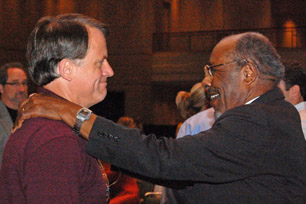 In 2008, the Evangelical Christian Publishers Association honored John Perkins with the Jordon Lifetime Achievement Award. I canceled whatever was on my schedule to attend the event at which he was presented with the award. After John spoke, I waited at a distance. Though ten years had passed since we’d last seen each other, his face lit up when he saw me, and he called me by name. A photographer snapped a picture of John greeting me, his hand on my shoulder, which appeared on the front page of a newspaper the next day. I still treasure that photo.
In 2008, the Evangelical Christian Publishers Association honored John Perkins with the Jordon Lifetime Achievement Award. I canceled whatever was on my schedule to attend the event at which he was presented with the award. After John spoke, I waited at a distance. Though ten years had passed since we’d last seen each other, his face lit up when he saw me, and he called me by name. A photographer snapped a picture of John greeting me, his hand on my shoulder, which appeared on the front page of a newspaper the next day. I still treasure that photo.
There’s so much good in Dream With Me, because it flows straight out of John’s heart. It’s honest, humble, prophetic, and Christ-honoring. We need to hear it.
John, you’ve shown me Jesus. Countless people would say the same. I look forward to spending time together on God’s new earth, where love, justice, and joy will be the air we breathe (see 2 Peter 3:13). Meanwhile, you have my heartfelt gratitude, brother. I’m encouraged by the words I believe Jesus will one day say to you: “Well done, my good and faithful servant.”


